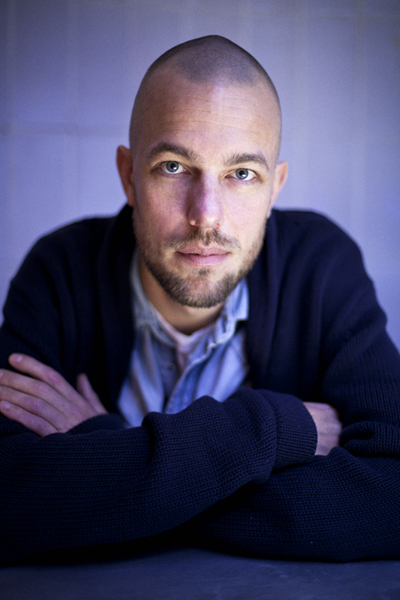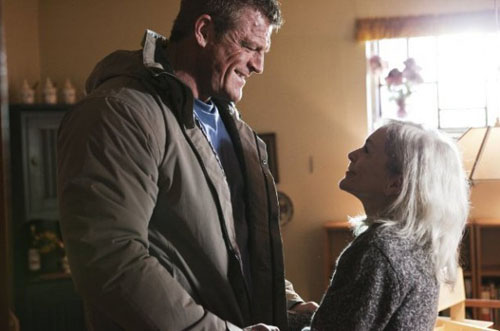 Back to selection
Back to selection
Five Questions with Teddy Bear Director Mads Matthiesen

 Kim Kold, the six-foot-something, 300-plus pound star of Teddy Bear, is a striking, memorable screen presence. In the first feature from Danish writer-director Mads Matthiesen, Kold plays Dennis, a mama’s boy who decides to travel to Thailand in search of a wife. Dennis knows this will irk the heck out of his possessive mother Ingrid (Elsebeth Steentoft), so he lies, telling her he’s off to Germany to compete in a bodybuilding competition. This buys him time, but ultimately Dennis will have to sort out his feelings: Is his desire to forge a life of his own as powerful as the security and routine provided by his dysfunctional relationship with Ingrid? Matthiesen’s disarming and funny film opens Wednesday, Aug. 22.
Kim Kold, the six-foot-something, 300-plus pound star of Teddy Bear, is a striking, memorable screen presence. In the first feature from Danish writer-director Mads Matthiesen, Kold plays Dennis, a mama’s boy who decides to travel to Thailand in search of a wife. Dennis knows this will irk the heck out of his possessive mother Ingrid (Elsebeth Steentoft), so he lies, telling her he’s off to Germany to compete in a bodybuilding competition. This buys him time, but ultimately Dennis will have to sort out his feelings: Is his desire to forge a life of his own as powerful as the security and routine provided by his dysfunctional relationship with Ingrid? Matthiesen’s disarming and funny film opens Wednesday, Aug. 22.
Filmmaker: The film is about a big, muscular guy, 38-years-old, whose mother treats him like a little boy—until he “betrays” her and goes off to Thailand in search of a wife. Where did you and Martin Zandvliet, your co-writer, come up with the idea for this script?
Matthiesen: Teddy Bear is, in many ways, inspired by a short film I directed four years ago, which I also co-wrote with Martin. The film is called Dennis and was at the Sundance Film Festival in 2008. While making the short I got to know the bodybuilder Kim Kold, who played Dennis. Kim was a non-actor and I met him doing casting sessions in the Danish bodybuilder community. I remember doing the first casting with him. He came in the room and started doing the lines. I knew at that instant that this guy was something special. He had talent and visually he was what I was looking for. Later in a master class I showed the director Frank Corsaro the short, and after seeing it he said: “Why don’t you make it into a feature?” This got me thinking, and after meeting with Martin Zandvliet we slowly started to work on the idea. When Martin came up with the idea to send Dennis on a trip to Thailand in the quest for love I was no longer in doubt that I wanted to do it. The whole idea of a very shy introverted person in a very masculine body, traveling on a trip to Thailand to find a wife, with a controlling mom at home not knowing what was going on, made me smile and cry at the same time. That had an immediate appeal.
Filmmaker: This is your first full-length feature. How was the project different from the many shorts you’ve directed over the past few years?
Matthiesen: Obviously it’s a much longer process doing a feature than doing a short. It takes longer time to write the script, finding the cast, preparing the shoots, shooting the film and so on. But it is also a bigger challenge because the money is bigger and there are expectations from investors. More people are getting involved making comments on the script. It took around three years from when the idea came about until the film opened at Sundance 2012. That’s a long time to keep yourself inspired and into the project. It was my first feature and it seemed like a lot of people had expectations and wanted to see what I could do with a feature film. That was also new and added a little pressure. That said, I don’t really see much difference between doing a feature and doing a short film. It’s a film getting made. A story that needs to be communicated with characters and acting. In many ways, it is as hard making a good short film as making a feature. But I do like the feature because you are able to communicate a longer story because you have more time to get involved with the characters.

Filmmaker: Teddy Bear explores two different kinds of love—romantic love, and the love that binds parents and children. What inspired you to take on such weighty stuff?
Matthiesen: For me, it’s two very basic kinds of love. And it is also, in many ways, classic to put them together and make them interact. The film very much deals with different approaches to love. Not only parent/children and romantic love but also different pathways love takes when two very different cultures meet. When the Western world meets a place like Thailand. I very much wanted to portray how those different kinds of love meet and conflict. For me, that is very basic and the root of a lot of problems—when people don’t understand the root of the other person’s love.
The film is also about the bonds, healthy and unhealthy, that we create with the people we are fond of. Dennis has to learn how to pursue happiness according to his own needs, and not allow himself to be dictated to by his surroundings and especially his mother.
Filmmaker: Your star, Kim Kold, has developed an acting career in the last few years, but you were the first to cast him when he appeared in your 2007 short Dennis. Why did you decide to cast a professional bodybuilder, and how has he evolved as an actor?
Matthiesen: When I did the short film Dennis, I needed to find a bodybuilder for the main part. I needed the look and the muscles. In Denmark the bodybuilder community is very small so I didn’t know if I could find a bodybuilder that could act, and therefore I didn’t know if I could do the film. Kim Kold was very much a bodybuilder by look and profession. But I didn’t know if he could act. Kim was very fast at picking up the way we needed to work to do the film, and I do think that over time has become even better. But I do think that it’s Kim’s natural acting talent that makes his performance strong.
Filmmaker: The film features both established actors and nonprofessionals. What’s the key to getting a good performance from someone who’s never really been on camera before?
Matthiesen: The most important thing is casting. You have to spend a long time finding the non-actors and rewriting the script so it fits the cast you have settled on. I use a great deal of time in the casting room and watching casting films. I keep on trying people out in second and third casting rounds, putting them together with other cast members to see how people fit. When I settle on the cast, I build in quite a bit of rehearsing time to get everyone comfortable and to explore the possibilities of the characters. I normally don’t try to make non-actors “act” too much or to make them be someone they are not like in real life. I try to help them find those emotions we all have and to make them forget about the camera’s presence. There are many different ways to go about it, and I don’t really have any pre-constructed method. I deal with the non-actors very individually.
